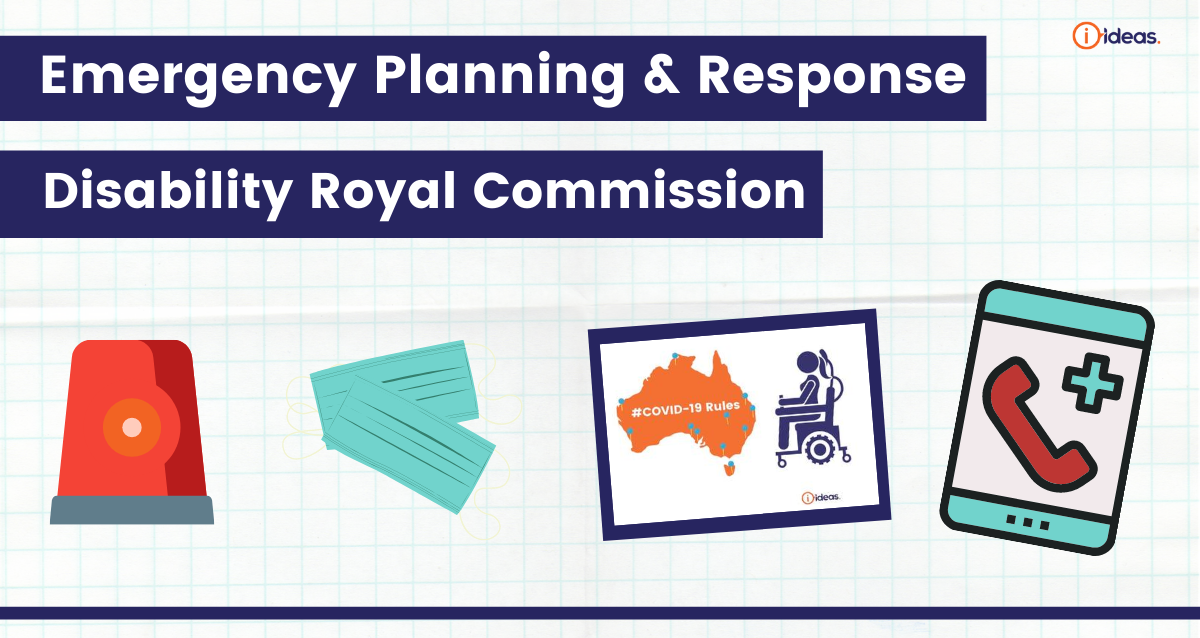The Disability Royal Commission into Violence, Abuse, Neglect and Exploitation of People with Disability is hearing from witnesses this week via a livestreamed public hearing on Emergency Planning and Response for people with disability.
IDEAS have prepared a submission outlining that having information that is accessible, timely and up to date is essential if people with a disability are to be prepared for and supported through emergencies.
Since April this year, IDEAS has been answering people's phone calls as part of our role with the National COVID-19 Disability Information Helpline. Our Information Officers have spent over 3,000 hours on the phones listening to people's concerns, questions and stories. What is clear from this is that people value having someone they can talk to about their individual circumstances and that the response they get is tailored to where they live, and what their particular needs are. Additionally, having access to up to date information, either on the phone or online is extremely important so that people can take steps to remain safe.
Along with COVID-19 IDEAS has also worked on fire and flood emergencies in regional NSW, particularly from 2010 to 2012. Our experience shows us that people with disability become more vulnerable when they are excluded. It is therefore vital to include people with disabilities in emergency planning at all levels of government – for federal, state and local. They are experts not only on their individual disability but also, importantly, on the barriers to people with disability getting their needs met safely.
IDEAS has prepared a submission which outlines how the information needs of people with a disability can be better met during emergencies.
![]() IDEAS Response. Disability Royal Commission Issues paper - Emergency Planning and Response
IDEAS Response. Disability Royal Commission Issues paper - Emergency Planning and Response
The Executive Summary Recommendations from IDEAS submission are:
-
Provision of emergency assistance to people with disability needs to have a base level of permanent funding with surge funding available at the onset of an emergency for a minimum of 12 months from the onset.
-
There needs to be a single, dedicated free call line for people with disabilities in permanent operation, which is advertised very heavily as the primary contact point for people with disabilities in times of emergency.
-
There needs to be an official, direct flow of information from all government agencies and departments involved in emergencies to inform that line in a timely manner.
-
People with disabilities, especially people with disabilities from Culturally and Linguistically Diverse and Aboriginal Torres Strait Islander backgrounds, should not have to wait for resources to be made accessible to them; resources must be designed to be completely accessible from the outset. A
-
Emergency assistance must be designed with an outreach surge capacity.
-
Emergency assistance should be able to be delivered on a dwelling-by-dwelling basis is safe to do so.
-
Dedicated teams for people with disability should be created from the outset.
-
Information practitioners already operating in the disability space should have their expertise recognised and be included in discussions with government committees regarding the health emergency, given that much of the remit of these committees has to do with communication of accurate and timely information.
-
Rapid and sometimes unpredictable developments are often a feature of emergencies, and websites need to be dynamic enough to cope with these.
IDEAS hopes that the experiences shared by everyone at the hearings, and by those who have made submissions, leads to better inclusion of people with a disability in emergency preparedness, response and recovery efforts in the future.
This weeks public hearing will be held from Tuesday 18 to Friday 21 August 2020. It will focus on the experiences of people with disability during the ongoing COVID-19 Pandemic as at August 2020. The hearing will be closed to the public, but will be live-streamed on the Royal Commission website.
IDEAS will also be sharing the hearings on Twitter, follow along for updates.
More Information
Support
The Disability Royal Commission has set up support services for people with disability affected by or interacting with the Commission process. These supports include counselling, advocacy, financial and legal help. For more information and links read our resource on Royal Commission Support Services.
About the Royal Commission
To see more about how the Disability Royal Commission works, other issues it is focusing on and how to have your say see Royal Commission seeks comment for Issue Papers
IDEAS does information so you can do life.



